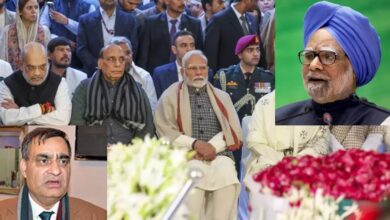UK’s top legal civil servant quits over Brexit deal changes
Jonathan Jones resigns after plans emerge to alter legally binding Northern Ireland protocol
The head of the UK government’s legal department has become the latest prominent civil servant to quit, after a significant disagreement with the attorney general over plans to override parts of the Brexit deal on Northern Ireland.
A spokesman for the attorney general’s office confirmed Sir Jonathan Jones had resigned but refused to comment.
On Monday, when it emerged the government was planning to table proposals on Wednesday to give ministers unilateral legal powers to oversee elements of the Northern Ireland protocol, the disclosure provoked widespread disquiet because the agreement was already legally binding.
Sources confirmed to the Guardian that Jones had clashed with Suella Braverman, the attorney general for England and Wales and advocate general for Northern Ireland, over points of law on several occasions, but most recently over her interpretation of the EU agreement.
Jones disagreed with Braverman’s initial interpretation of the legal implications of a no-deal Brexit, and questions were raised about whether government plans to override the Brexit withdrawal agreement were in breach of the ministerial code, which obliged ministers to follow the law, including international law, the Guardian understands.
Brandon Lewis, the secretary of state for Northern Ireland, admitted in the House of Commons on Tuesday that the plan “does break international law in a very specific and limited way … There are clear precedents for the UK, and indeed other countries, needing to consider their international obligations as circumstances change.”
It is understood that Jones was also aware that stepping outside the law would be a breach of the civil service code, by which he is expected to abide.
Downing Street accepted Braverman’s interpretation of the law after seeking external advice from a leading QC, who gave the opinion the move would breach international law, a Whitehall source confirmed.
Jones has been heavily involved in many aspects of recent government policy, including Johnson’s controversial decision to prorogue parliament in September last year to avoid scrutiny of Brexit plans. The decision was overturned by the supreme court, which ruled that the prorogation was both justiciable and unlawful.
On Tuesday, Jones sent a leaving email to staff in the government’s legal department that did not explain why he had stood down, but praised their work on the legal complexities of leaving the EU.
Addressed to “Dear colleagues”, he wrote: “I have completed almost seven years as Treasury solicitor and over 31 as a government lawyer. I am immensely privileged to have had a fascinating and rewarding career in the civil service. I am proud of what we have done to create and build the government legal department, the hard work of you all in GLD, as well as AGO [attorney general’s office] and the wider government legal profession, and the outstanding service you have provided across all areas of government, including the unique legal and constitutional complexities of leaving the EU, and latterly the response to Covid-19.”
Jones’ resignation caused unease among many prominent legal figures. Charlie Falconer, the former solicitor general said: “He is very modest, he is very clever, a cerebral lawyer but not pompous and he always saw his role to come up with pragmatic solutions to the government he served.
“He backs away from the limelight so I am absolutely amazed. He is absolutely not the sort of person to do something dramatic. He is always practical. He would never have resigned if the QC had advised a different view – he is totally lacking in self-importance.”
Falconer, now shadow attorney general, said the positions of Braverman and of the justice secretary, Robert Buckland, should now be in question, as members of the government which has admitted it intended to break the law.
A prominent employment QC, John Bowers, said it was “very worrying to see the resignation of the excellent Jonathan Jones. It feels like we are living through a constitutional coup.”
Jessica Simor QC, who sits on three of the attorney general’s lawyers’ panels and was involved in the article 50 Brexit case, told the Guardian: “Officials give impartial advice to ministers which they should follow when it comes to the law. If they are told it’s illegal then they shouldn’t do it, which is presumably why Brandon Lewis did not lie to parliament.”
Philippe Sands QC, professor of international law at University College London, said he believed that for Jones the dispute over breaking the international agreement with the EU was “the final straw” following other disputes.
“His going raises very serious questions for other civil servants on offering legal advice,” Sands said. “It also raises very serious questions about the UK’s commitment to rule of law. The UK abroad has been renowned for proceeding very carefully. Their respect for a country they have looked up to in its commitment to the rule of law is crumbling. Amongst those charged with giving legal advice to the government, morale is very low.”
Legal experts have said the dispute could end up in the European court of justice if it breaches the withdrawal agreement signed by Boris Johnson in January. The court can impose a heavy fine on the UK, suspend part of the withdrawal agreement, launch trade wars and impose tariffs or even sanctions on British exports.
Jones becomes the sixth senior Whitehall figure to resign in recent months, including the cabinet secretary, Mark Sedwill, the Foreign Office permanent secretary, Simon McDonald, and the Jonathan Slater from the Department of Education. Sir Philip Rutnam, former permanent secretary at the Home Office, has begun legal proceedings against the department for constructive dismissal.
Jones seems to be the latest victim of a drive by No 10 radically to reshape the civil service, a process spearheaded by Johnson’s chief of staff, Dominic Cummings, who reportedly told aides that a “hard rain” was heading for uncooperative Whitehall officials.
Since you’re here …
… joining us from India, we have a small favour to ask. Millions are flocking to the Guardian for quality news every day. We believe everyone deserves access to factual information, and analysis that has authority and integrity. That’s why, unlike many others, we made a choice: to keep Guardian reporting open for all, regardless of where they live or what they can afford to pay.
As an open, independent news organisation we investigate, interrogate and expose the actions of those in power, without fear. With no shareholders or billionaire owner, our journalism is free from political and commercial bias – this makes us different. We can give a voice to the oppressed and neglected, and stand in solidarity with those who are calling for a fairer future. With your help we can make a difference.
We’re determined to provide journalism that helps each of us better understand the world, and take actions that challenge, unite, and inspire change – in times of crisis and beyond. Our work would not be possible without our readers, who now support our work from 180 countries around the world.







